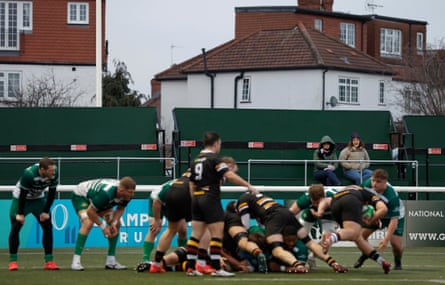At first glance English rugby has increasing reasons for optimism. A shiny, happy grand final awaits at Twickenham on Saturday involving two teams laden with high-quality homegrown players. The national team are showing genuine signs of life, as they hope to demonstrate against the All Blacks next month. Both sides also insist relations between the Rugby Football Union and the Premiership clubs are less fractious than for many years.
Dig a little deeper, though, and the reality is less glitter-strewn. There are only 10 of those aforementioned Premiership clubs still standing and increasingly few are in rude financial health. Adult male participation at club level continues to decline. A growing number of parents are wondering if there might be less fraught school sports for little Jonny or Mary to play. And, as this week’s latest cry for help from the Championship makes clear, there may soon be a cavernous void where a vibrant and ambitious second tier of clubs should be.
This tends to be a less sexy topic than, say, discussing the potential weekend impact of Northampton’s Fin Smith or Bath’s Ollie Lawrence. But both of those England squad members, in their way, are pertinent examples of the winding road that many professional players have to take. Both were left high and dry when Worcester went out of business in 2022. Smith has played in the Championship at Ampthill while Lawrence was drawn to rugby partly because his father used to play for Moseley. Maybe they would have made it the top anyway but the point is this: breeding good young English players is about more than a ringfenced 10-team Premiership.
This longstanding argument is reaching a crucial stage. In their latest message the Championship clubs have made it abundantly clear they can no longer accept the relative crumbs being offered from the top table under the terms of the proposed new Professional Game Partnership (PGP). They are bluntly warning of more clubs potentially going bankrupt, which “would also further isolate the Premiership to the detriment of the game in England.” They talk of “arbitrary decisions” by the RFU having left the Championship clubs in “a precarious position” and argue that, because of the continuing funding imbalance, a proposal for a playoff between the bottom Premiership team and the winners of the Championship is essentially window dressing.
The last point cuts to the heart of the matter. With a winless Newcastle Falcons bumping along the bottom of the table, there is less of the jeopardy beloved of television executives. The absence of promotion and relegation from the equation is understood to have been among the reasons why the Premiership eventually had to accept a reduced £26m sum per annum for its latest two-year television deal with TNT Sports. Once CVC Capital Partners’ 27% share of the commercial cake is sliced off, sources suggest the 10 Premiership clubs are likely to end up receiving about £1.9m apiece a year. Compare that with the soaring figures in France, where the Top 14 broadcasting deal is set to rise in value by 13.3 %.
It reflects an increasing tale of two contrasting philosophies. In France the big game this weekend is the ProD2 playoff final between Vannes and Grenoble, being played in Toulouse. If Vannes win, it will be the first time a club from the north-west region of France has reached the Top 14. What a story that would be, in addition to being another reflection of club rugby’s growing footprint across the country.
It is rather different in England. Take the Cornish Pirates, who finished second in this season’s English Championship. Their heroic long-term backer, Sir Dicky Evans, is in declining heath and announced a “Sunset Plan” in 2022, giving notice that funding would cease in 2025. There has been interest from a couple of international consortiums but, as things stand, staff wages are not guaranteed beyond January. This season only Doncaster Knights satisfied the minimum standards and facilities criteria currently required for any side to be admitted to the Premiership.

If these strict rules are retained and no funding parity is introduced for promoted clubs it becomes almost impossible for “outsiders” to join the party. Championship officials argue promotion and relegation is “an essential feature” of the game in this country and that a ringfenced Premiership increases the risk of people losing interest in the game. “The PGP is about the next eight years at a time when the game globally and nationally is changing rapidly, so this is a pivotal moment,” read their statement on Monday. “If there are not changes now, it will be too late.”
after newsletter promotion
The RFU, in response, says that it will be “disappointed if the Championship clubs choose to disengage in the process” before a crucial RFU council meeting on Friday week. But, ultimately, it boils down to priorities. Does it want ambitious clubs below the Premiership? The Championship says proposed future RFU funding for the entire 12-team league is £4m, much of it “value in kind” assistance. Per club it barely buys the torso of Finn Russell, Bath’s kingpin fly-half. Is the RFU really saying that everything beneath the Premiership is irrelevant to the health of the game? That a club pathway to the top tier is no longer desirable? All while shelling out £33m a year to 10 “elite” clubs who may or may not be financially stable or competitive? Saturday’s final will be fun but not everything in English rugby’s garden is rosy.
Source: theguardian.com


